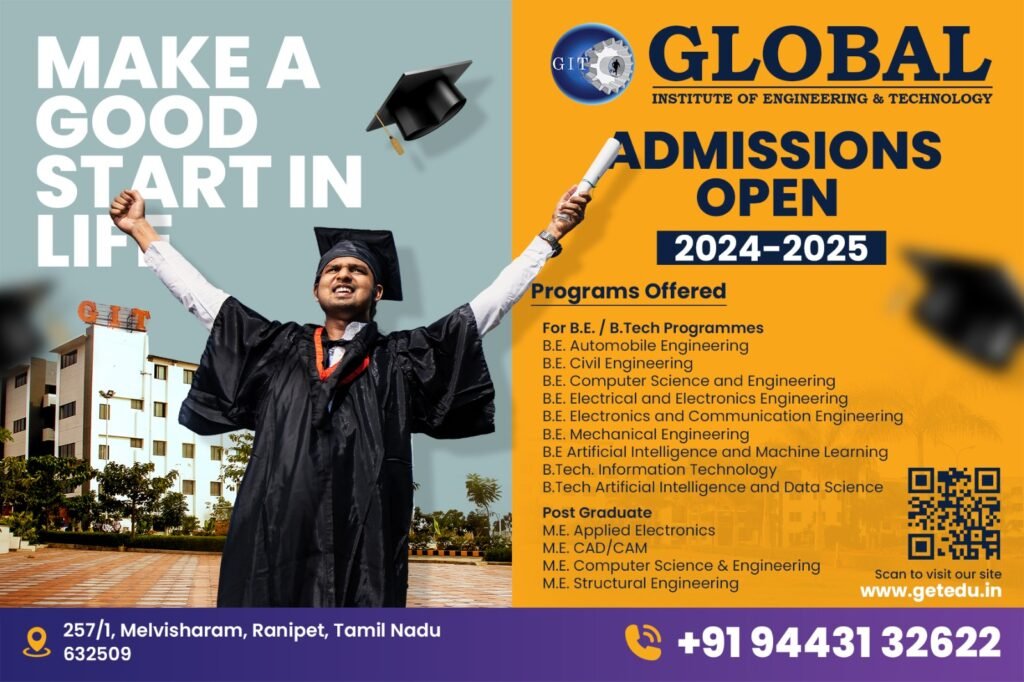About the department
The Department of Artificial Intelligence and Machine Learning at Global Institute of Engineering and Technology is empowered to facilitate students with a sound conceptual understanding of AI technologies and machine learning concepts. Students are educated in prevalent data domains like Computer Vision, Natural Language Processing, Speech Recognition, Business applications and Robotics. The programme offers hands-on learning experience and enables students with an impact of job-ready career.
To achieve success in the fields of artificial intelligence and data science by utilizing creative research concepts that address social concerns.
- To provide graduates with the skills necessary for the workforce by utilizing cutting-edge infrastructure.
- To impart moral principles that advance society on a personal and professional level.
- To encourage innovation in advanced learning, business, and research in order to address global concerns
The Machine Learning and Artificial Intelligence program is designed to nurture and transform students into highly skilled professionals.
- The modules are designed to gain a hands-on approach to understanding different types of analytics and their uses to make informed data-driven decisions system.
- The Laboratories of the department are equipped with highly configured computer systems catering to a student-system ratio of 1:1.
- The students are technologically trained with transformative series of tools such as MySQL, Python, Tensorflow, Spacy, Spark, Data Robot, Natural Language Tool Kit (NLTK), robotic simulators, Google ML Kit.
PEO1: Apply your foundational understanding of engineering principles to succeed in business and further education.
PEO2: Examine, create, and put into practice IT-based solutions to address real-world issues.
PEO3: Demonstrate professional and ethical values, soft skills, and a drive for lifelong learning in order to lead a successful professional career.
Engineering knowledge: Apply the knowledge of mathematics, science, engineering fundamentals, and an engineering specialization to the solution of complex engineering problems.
Problem analysis: Identify, formulate, review research literature, and analyze complex engineering problems reaching substantiated conclusions using first principles of mathematics, natural sciences, and engineering sciences.
Design/development of solutions: Design solutions for complex engineering problems and design system components or processes that meet the specified needs with appropriate consideration for the public health and safety, and the cultural, societal, and environmental considerations.
Conduct investigations of complex problems: Use research-based knowledge and research methods including design of experiments, analysis and interpretation of data, and synthesis of the information to provide valid conclusions.
Modern tool usage: Create, select, and apply appropriate techniques, resources, and modern engineering and IT tools including prediction and modeling to complex engineering activities with an understanding of the limitations.
The engineer and society: Apply reasoning informed by the contextual knowledge to assess societal, health, safety, legal and cultural issues and the consequent responsibilities relevant to the professional engineering practice.
Environment and sustainability: Understand the impact of the professional engineering solutions in societal and environmental contexts, and demonstrate the knowledge of, and need for sustainable development.
Ethics: Apply ethical principles and commit to professional ethics and responsibilities and norms of the engineering practice.
Individual and team work: Function effectively as an individual, and as a member or leader in diverse teams, and in multidisciplinary settings.
Communication: Communicate effectively on complex engineering activities with the engineering community and with society at large, such as, being able to comprehend and write effective reports and design documentation, make effective presentations, and give and receive clear instructions.
Project management and finance: Demonstrate knowledge and understanding of the engineering and management principles and apply these to one’s own work, as a member and leader in a team, to manage projects and in multidisciplinary environments.
Life-long learning: Recognize the need for, and have the preparation and ability to engage in independent and life-long learning in the broadest context of technological change.
Graduates of Artificial Intelligence and Data Science Program will be able to:
- To address technological issues, apply the core ideas of data science and artificial intelligence.
- Get creative with your business solutions by leveraging AI and data science technologies.
- Apply the subject matter expertise to build a prosperous career as an employee, business owner, and engineering professional

